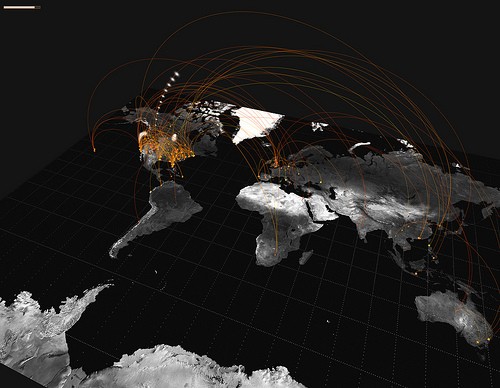ITU proposals threaten Internet freedom and access
As the International Telecommunication Union’s December negotiations move closer, more worrying developments are coming to light. We recently posted about some of the main concerns raised by the secretive negotiations, which threaten to change the Internet as we know it.
As the International Telecommunication Union’s December negotiations move closer, more worrying developments are coming to light. We recently posted about some of the main concerns raised by the secretive negotiations, which threaten to change the Internet as we know it.
This week a report by Rohan Samarajiva at LIRNEasia confirmed these concerns. Looking at the ‘ETNO’ proposals, and the more complex and insidious shift in definitions proposed by Egypt on behalf of the Africa Region, Samarajiva explains the potential impact on Internet freedom and on developing countries.
As we mentioned in our previous post, the European Telecommunications Network Operators Association (ETNO) are concerned about the success of online content providers, and are trying make sure they can cash in on that success. Samarajiva explains that the ETNO proposals would designate content providers as “call originators” who would have to pay Big Telecom a rate based on how much bandwidth the content uses.
Content providers like YouTube or Hulu already commercially negotiate the leasing of network capacity from Internet service providers and pay for quality control. However giving this the force of law as the ETNO proposals require “turns the concept into a government-sanctioned leveraging tool operators can use to extract high sums from content providers with no room for negotiation”.
The report highlights concerns that have also been raised by the Centre for Democracy and Technology: that the ETNO proposals are particularly harmful to the developing world because accessing content will become more expensive as content providers have to pass these extra costs on to Internet users. Some content providers might choose to simply stop servicing regions with customers that have limited buying power.
This loss of content could then translate to slowed national economic development, “given the role played by the Internet in supporting these countries’ transitions from low-income to middle-income economies”. The new costs could also tilt the Internet’s level playing field by adding a barrier to market entry that would make it more difficult for start-up services to compete.
Samarajiva’s other major concern is with the Africa Region’s proposals, which seek to broaden telecommunications definitions to give the ITU and its member states extraordinary regulatory power. Among other things, these proposals could legitimize undemocratic practices like censorship and control over citizens’ Internet access, and promote mandatory cross-border information sharing, creating major privacy concerns.
This expansion of the ITU’s regulatory power is, at best, unnecessary as the ITU is unsuited to providing technological solutions, and these proposals undercut the efforts of existing multi-stakeholder efforts that promote public-private partnership, and collaboration with technologists, academics, and civil society groups. At worst, these proposals could reverse a trend of Internet expansion in the developing world, and legitimize undemocratic practices.
It’s the role users play in Internet governance, not governments and big telecom conglomerates, that should be expanded. We can engage with a citizen-driven alternative to the closed IT process now by signing the Declaration of Internet Freedom and staying engaged as more opportunities to develop it arise.
For more information about the ITU proposals see the CDT ITU resource center and the Access resource center, and their online petition.
We’re keeping a close eye on this, so stay tuned at openmedia.org.


 Take action now!
Take action now!
 Sign up to be in the loop
Sign up to be in the loop
 Donate to support our work
Donate to support our work